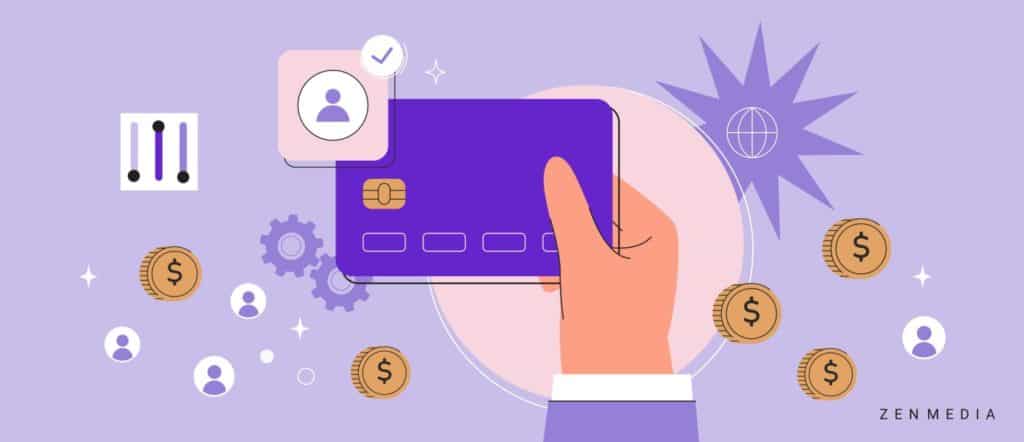Since the origin of the ATM, technology has been transforming financial services at a dizzying pace, offering fertile soil for FinTech operations to emerge and grow.
Financial institutions in particular seek to invest and collaborate with FinTech operations because it allows them to gain access to leading-edge innovations. FinTech has created disruptions in operations like online banking, mobile accessibility, and virtual payment systems.
So what do marketers need to know in order to reach this booming tech sector? Here’s an in-depth look at how the FinTech sector is developing in 2023.
3 Essential Takeaways for FinTech Marketing in 2023
1. Accelerators Build Strategic Partnerships
Financial institutions are scouting for partners that could produce the next innovation to transform their business.
One way some companies are doing that is to establish business accelerators and incubators for budding FinTech firms, offering expertise, mentorship, and sometimes capital to jumpstart small businesses in the field. Though not originally the province of financial institutions, business accelerators and incubators have become a way to build strategic partnerships with future vendors and partners. As the demand for digital financial services increases, financial service companies need to position themselves on the leading edge of financial technology.
Jumping into the fray are multinational commercial banks like Wells Fargo and Barclays, digital financial suppliers like Yodlee, and independent community banks like members of the ICBA. The Bank of England became the first central bank to establish an incubator program to harness FinTech innovations for its entire national banking system.
The coronavirus pandemic has intensified the need for digital financial solutions as branches close and financial services shift almost exclusively online. Financial institutions are always implementing new digital strategies that provide an edge over competitors. Accelerator and incubator programs can help cultivate businesses focused on providing those solutions.
Many of the institutions creating accelerators already have expertise and experience in building, growing, and capitalizing startups and can connect emerging companies with mentoring opportunities to guide their progress. Each accelerator program offers its unique set of features, including close relationships with industry investors, all-virtual programming, and a gathering with tech innovators in Silicon Valley.
These accelerators and incubators are more critical to the development of FinTech startups than ever. Tearsheet reports that Fintech investments are down from $35 billion in Q3 2021 to $13.3 billion in Q3 2022.
The venture capital company Y Combinator kicked off the wave of FinTech investors in 2005 with its biannual three-month startup bootcamp for early-stage outfits. Y Combinator seeds each participant with $125,000 and connects them with investors at its Demo Day, when the founders pitch their products and services. Y Combinator’s narrow focus on first-phase investment and growth sets it apart from the other FinTech supporters here.
Takeaway: Marketers should keep a pulse on not only big-name accelerators, like Y Combinator but also the smaller, FinTech-focused incubators. These startups often need digital marketing support early on, as much of the training they receive is on running the business, not getting the word out.
2. Community Banks Covet Cutting-Edge Technologies
Independent Community Bankers of America (ICBA) believes that “with a wide range of FinTech education, partnerships and vetted solutions, community banks have the resources” required to develop “the high-tech, high-touch edge that will help them thrive in their marketplace.”
ICBA’s ThinkTech program accelerated eight successful FinTech companies whose products and services are “specifically tailored for community banks.” One company spawned by the accelerator employs AI/machine learning to improve consumers’ debit and credit dispute experiences. Another helps community banks build more robust customer relationships through cash-back merchant-funded offers.
Working with The Venture Center, a connector between technology and entrepreneurs, ThinkTech exposes FinTech founders to bankers, bank regulators, and representatives of core processing companies to tackle issues that will inevitably come up as their businesses mature.
The financial consulting firm Accenture operates the FinTech Innovation Lab, linking fledgling FinTech enterprises with banking and insurance leaders through workshops and conferences. The FinTech Innovation Lab claims 287 early and growth-stage graduate companies have raised $2.7 billion in capital from their participation and created 2,900 jobs.
Multi-national commercial banks have jumped feet first into the accelerator pool to generate their own FinTech partnerships and gain insights into new innovative solutions developed by startups. As documented by Business Insider magazine, Wells Fargo, Citibank, and Barclays are leveraging their size, market power, and wide-ranging expertise to provide FinTech startups with robust accelerator programs that transition ideas into marketplace successes.
Takeaway: FinTech innovations are happening faster than ever before. Your next B2B marketing opportunity may be for a product you’ve never even heard of—so it’s imperative to cultivate an agile, learning-focused, and innovative mindset in your team.
3. Pre-Existing Digital Platforms Gain an Edge
Wells Fargo is particularly well-positioned for the Covid-19 era because its accelerator program has always been virtual, from application to mentorship to graduation. While other institutions scramble to pivot their offerings, Wells Fargo already operates entirely in the digital space. This is a vivid example of how FinTech can benefit early adopters.
The nation’s fourth largest bank, with $1.71 trillion in assets as of September 8th, 2022, Wells Fargo dedicates in-house business and technology experts to the accelerator program, collaborating with startups on proof-of-concept projects necessary to raise capital from investors. The bank offers participants the opportunity to pilot their solutions from inside the accelerator, giving Wells Fargo the right of first refusal to use the solution and aiding liftoff at the conclusion of the program.
The bank sets aside up to $1 million to invest in each of the best prospects. With an acceptance rate under one percent, participating startups have already demonstrated their promise.
U.K.-based Barclays takes a different route, partnering with the U.S. firm Techstars and its robust network of industry experts and angel investors. Startups occupy offices in Barclays’ proprietary workspace alongside other participants and speed date with 100 mentors to find their best fits. They have access to daily industry events, meetups, and even a recording studio and can continue to scale their operations after the program in the shared workspace.
Barclays and Techstars combine to invest a six percent equity stake in each company. Barclays relies on the FinTech innovators in the accelerator to solve the bank’s secondary issues while its own developers concentrate their limited resources on primary concerns. This partnership between Barclays and Techstars also provides a great opportunity for fintech app development company to showcase their innovative ideas and potentially receive investment from the program.
For the USA’s third largest bank, Citi, with assets of $1.7 trillion in Q1 of 2022, the four-month accelerator that began in Israel is now replicated in five other countries, including the U.S. Working with the accelerator platform Plug and Play, Citi focuses its efforts on startups that might enhance business operations at the bank. It typically seeks companies less than 18 months from a commercially viable product or service and works closely with them to develop solutions that can be implemented at the bank. Citi does not invest in its accelerator companies but claims it has helped its 90 participants raise north of $1 billion.
There are numerous other FinTech accelerators with varying requirements and benefits, some financial institutions and some with long experience operating incubators and accelerators. Undoubtedly, many will move – or already have – to a fully-digital platform, at least for the foreseeable future. And while investors may have closed their wallets for the moment, many are searching for just the kind of technological innovations that may be immune to viruses and their effect on the economy.
Takeaway: As with every industry, FinTech companies are looking toward a future that has been irrevocably shaped by Covid-19. FinTech companies require the kind of agile, forward-thinking marketing tactics that can turn this unprecedented moment into momentum.
Ready to talk? Contact us today!




